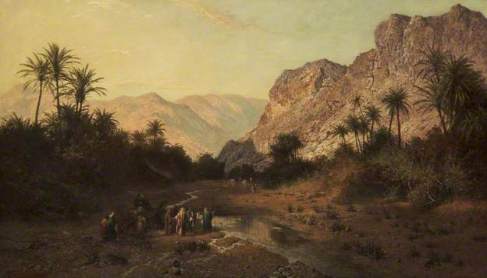Edward Henry Holder. ‘Rephidim, Desert of Sinai’, 1877. Tameside Museums and Galleries, The Astley Cheetham Art Collection.
More than one of the great ascetic Fathers of the Egyptian and Syrian deserts has noted this fact: what we give ourselves to most readily is what we love. Now that is fine when we give ourselves to prayer and good works, to love of God and meditation upon the scriptures, to the emptying of ourselves in favor of charity toward others. As St. Ephrem the Syrian said: ‘Whenever I have meditated upon You, I have acquired a veritable treasure from You. Whatever aspect of You I have contemplated, a stream has flowed from You; there is no way I can contain it.’ But then St. Ephrem goes on to add: ‘Your fountain, Lord, is hidden from the person who does not thirst for you.’ And if that fountain is hidden from me, because I do not thirst for it or seek it, what then? I am left to my own devices, and then the horrifying fact begins to make itself clear: the things I give myself most readily to are the things I love, and the things I love when not living a life of grace can be unbeautiful indeed. Anger, rages, harsh and hateful words, resentments, ugly thoughts and urges and actions directed toward anything but the upbuilding of myself and others in the Lord: if I give myself readily to these things, if I make myself their servant and slave, are they not what I most love? How can I free myself from their bondage and sin?
This was really a large part of the problem of the Israelites in the desert of Sinai, when through lack of faith they made themselves an idol to worship, as we see in today’s responsorial psalm: ‘Our fathers made a calf in Horeb / and adored a molten image; / They exchanged their glory / for the image of a grass-eating bullock.’ They gave themselves readily to what they most loved, in fact, creating a lifeless image of the worthless self-willed emptiness to which they ardently desired to prostrate themselves as slaves. They were a fine example of what St. Macarius of Egypt in one of his spiritual homilies would describe as ‘men with no foundation at all, a mere collection of impulses’. This Lent I might seriously ask myself this question: ‘Am I too a mere collection of random and disconnected impulses, experienced and acted upon to no divine purpose?’ If I am forced to answer this question in the affirmative to any degree at all, I would do well to take these pieces of spiritual advice, again from St. Ephrem: ‘Blessed is the person who has consented to become the close friend of faith and of prayer: he lives in single-mindedness and makes prayer and faith remain to reside with him.’ And: ‘Be constantly praying, day and night, as a ploughman who ploughs again and again, whose work is admirable. Do not be like the lazy ones in whose fields thorns grow. Be constantly praying, for he who loves prayer will find help in both worlds’

